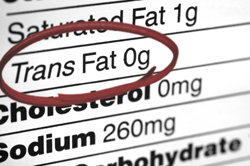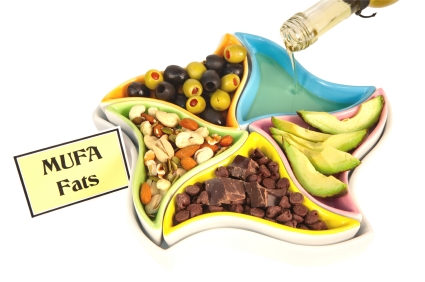 If we could all count the times we’ve heard someone say they’re on a low-fat diet to lose weight, we’d all have enough money to own a small country. The idea that all fats make you fat has been engrained into so many minds, yet it’s simply untrue. In fact, not only can we be skinnier by eating fats, but our bodies absolutely need fat to stay healthy.
If we could all count the times we’ve heard someone say they’re on a low-fat diet to lose weight, we’d all have enough money to own a small country. The idea that all fats make you fat has been engrained into so many minds, yet it’s simply untrue. In fact, not only can we be skinnier by eating fats, but our bodies absolutely need fat to stay healthy.
Knowing which fats are good, not-so-good, and downright bad will help you decipher even the most deceiving labels at the grocery store.
Friendly Fats
In general, unsaturated fats are the good guys. Studies suggest that these good fats can help lower your LDL cholesterol (the “bad” cholesterol), prevent heart disease, and help reduce inflammation. Furthermore, it can help you shed weight because eating a meal rich in good fats will help you feel full faster and for longer periods of time afterwards so you don’t get the urge to “snack” so often.
Unsaturated fats can be broken down to monounsaturated and polyunsaturated fats, both of which you should incorporate into your diet on a regular basis. The most important polyunsaturated fats that your body needs but can’t make are the Omega-3, Omega-6, and Omega-9 fats.
The SAD (Standard American Diet) typically provides more than enough Omega 6’s, so it’s more important to balance this by consuming more Omega 3’s (or 9’s). Sources of these essential oils are flaxseed, walnuts, and fish (especially fatty fish like salmon or mackerel).
Equally important are the monounsaturated fats. Fill up on avocadoes, almonds, extra virgin olive oil (cold-pressed and organic whenever possible), and most nuts and seeds.
Nut oils like almond oil or macadamia nut oil, as well as nut butters, are also good sources of monounsaturated fats. The only catch is that polyunsaturated oils should be used for cold dishes.
Such oils become damaged quickly when exposed to heat, making them rancid and leading to free-radical oxidation in the body. This is the reason why you should never cook with olive oil. Free-radical oxidation is associated with heart disease, neurodegenerative diseases like dementia and Alzheimer’s, and is a great player in the aging process.
The So-So Fats
 Saturated fats are usually those that are solid at room temperature: butter, lard, ghee, etc. A general rule of thumb is that meat and meat-based products contain saturated fats. Excessive consumption of such food items has been shown to contribute to heart disease, chronic degenerative conditions, and raise levels of HDL (the “good” cholesterol).
Saturated fats are usually those that are solid at room temperature: butter, lard, ghee, etc. A general rule of thumb is that meat and meat-based products contain saturated fats. Excessive consumption of such food items has been shown to contribute to heart disease, chronic degenerative conditions, and raise levels of HDL (the “good” cholesterol).
In addition to the butter, lard, and ghee, eggs and full-fat dairy are also examples of saturated fats that, though beneficial in other ways, should be consumed moderately or even minimally, with the exception of eggs, which—if free-range and organic– is chalk full of essential nutrients we can’t live without.
However, there is one saturated fat that is exceptionally healthy for us. Coconut oil is one of nature’s superfoods, for its amazing abilities to reduce inflammation, prevent a whole host of diseases from cancer to arthritis and diabetes, cure age-related dementia’s and so on.
Ideally, coconut oil should be unrefined. At room temperature, coconut oil should be solid. It’s an excellent choice for cooking oil, because it’s much more stable than conventional cooking oil, meaning you can cook at frying temperatures and still not damage the molecular structure of the fat. Another saturated oil that is healthy is palm oil. It’s a bit trickier to find, but great for cooking at moderate temps.
The So-Bad-They-Shouldn’t-Have-Been-Invented Fats
 If fats had faces, trans-fats would be the ugliest, scariest faces of the bunch. Hydrogenated and partially hydrogenated fats and oils are types of trans-fats, and you should steer clear of them at all costs. Trans- fats were lab created in order to make a cheaper alternative to vegetable oil– hence, the birth of margarine and shortening.
If fats had faces, trans-fats would be the ugliest, scariest faces of the bunch. Hydrogenated and partially hydrogenated fats and oils are types of trans-fats, and you should steer clear of them at all costs. Trans- fats were lab created in order to make a cheaper alternative to vegetable oil– hence, the birth of margarine and shortening.
In the lab, scientists took polyunsaturated fats like vegetable oil and blasted it with hydrogen, which changed its molecular structure made the resulting compound solid at room temp rather than the characteristic liquid. As if that’s not enough, artificial dyes and flavors have to be added to these substances in order for them to produce that oh-so-familiar taste of margarine, shortening, and other “spread” that so many people have come to love. But it’s not just margarine and butter wanna-be’s that have trans-fats.
Other popular snacks, both sweet and salty, are laden with hydrogenated or partially-hydrogenated oils. The most common ones include cookies, chips, packaged pastries (cakes/brownies), even some trail mix and granola bars. Be sure to read the ingredients label in the back– just because the front of the box says “Zero grams” trans-fat, does not mean it’s fat-free; it means there could be up to 0.99 grams of trans-fats per serving. Even small amounts of trans-fats have been shown to significantly increase the risk of heart disease, so no amount of trans-fat is safe.
Put the Magnifying Glass Away
Even though it seems like finding real food takes some detective work these days, it doesn’t have to be that complicated, as long as your follow a few simple rules:
- When you see the words fat-free, low fat, put it away. What you don’t get in healthy fat, you get in chemicals and other nasty additives which, as you can already guess, is much more dangerous to your body than just plain ol’ fat.
- The most truthful part of any packaged food is the ingredients list. Forget about that ambiguous chart with the calories. If you want to know how safe the food is, read what’s in it. As soon as you see the words hydrogenated or partially-hydrogenated, put it down. Unless you want an express pass to the land of Fat-N-Sickville.
- Always consider the source of the products. If you choose to eat animal products, go as natural as possible. Ideally, the animals should be pasture-raised or grass-fed, organically raised, free-range (for chicken, turkey, duck, etc), and- unless you live in New York City or some other big city- grown locally. Raw, unpasteurized milk is the most nutritious form of milk, so grab it if you can find a trusted source. Yes, they can be quite pricey, but knowing that you’re not full of injected hormones and antibiotics should make it all worth it.
- Food first, then supplement. Those bottled pills you see at the health foods store aren’t called “replacement food”. They’re named “supplements” because you’re supposed to use them as a secondary source of nutrition. Remember, whole food is always the best choice for getting nutrition. The only exception to this is when you’re concerned about genetic engineering, the safety of the processing methods, the possibility of contamination, and so forth, but that’s another topic altogether. If you have access to pure, organically-grown produce, make it a point to choose them over pills, capsules, and tablets.
- No fried fat or oil is ever a good fat. Frying causes oxidation, and oxidation causes havoc in your cells. Yes, coconut oil is safer to fry with than any most conventional oils, but it doesn’t mean you should consume the used oil once it’s been used.Besides, the frying process creates acrylamides, chemical byproducts that are highly toxic and carcinogenic.
Incorporating the right types of fats into your diet can have profound effects on your weight loss journey and in your overall lifestyle.
Simply switching out your morning bagel for an avocado, your mid-afternoon muffin for mixed nuts, or your chicken dinner for salmon can increase your good fat intake without giving you that greasy, heavy feeling normally associated with fats. As you continue refuel your body with the fats your body craves, you’ll begin to see the difference in your weight, your skin, brainpower, and overall vitality.
If you find this article beneficial, you’ll find the following video extremely helpful to help you lose weight – 4 Foods to Never Eat For Breakfast.
About the Author:
Emma Deangela is the best selling author of The Alkaline Diet Program and 80/20 Fat Loss. She has helped over tens of thousands of men and women to lose weight and transform their health with sound nutrition advice.
Which wonderful friends in your life are blindly avoiding the healthy fats and eating the worst fats and end up gaining weight?
Please help them achieve their fat loss goals and better health by sharing this eye-opening article with each of them using any of the social media and email buttons below.

Leave a Reply